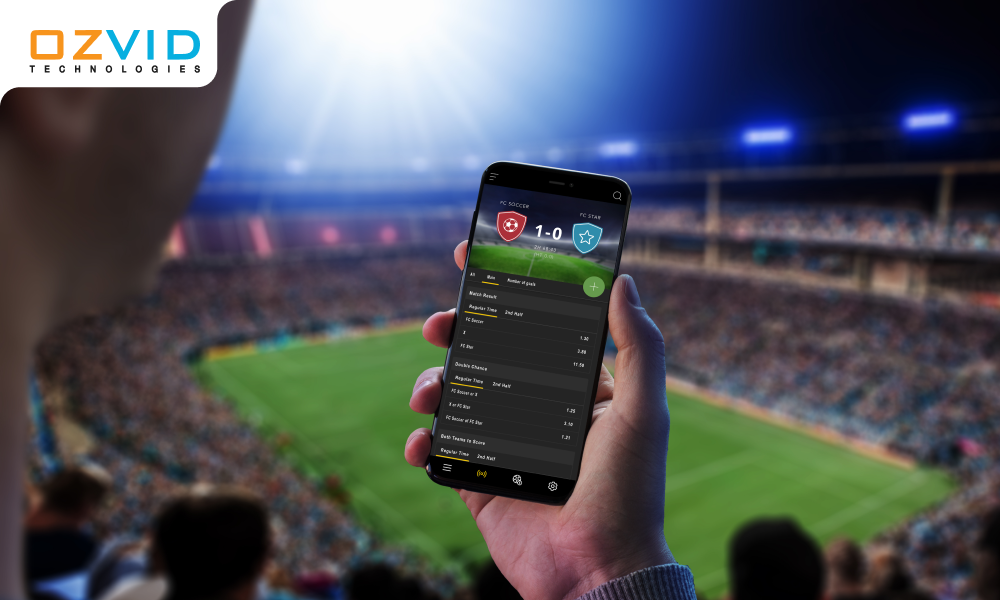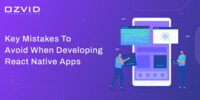- Jan 12, 2026
Share this post on:

Did you know that the global sports app market is booming at an impressive pace? It was valued at around USD 3.66 billion in 2022 and is expected to more than double, reaching almost USD 8.03 billion by 2030, with a steady growth rate of about 10.9% every year. This surge reflects how mobile sports experiences are becoming a major part of fans’ daily lives worldwide. The sports industry has rapidly evolved with the rise of digital platforms, giving audiences an entirely new way to experience sports beyond stadiums and television screens. Fans now demand instant updates, live streaming access, real-time statistics, fantasy leagues, social engagement, and even secure online betting - all within a single mobile application. This transformation has fueled the global demand for innovative sports app solutions that not only elevate fan experiences but also generate strong business revenue through ads, subscriptions, in-app purchases, and betting features.
As the market continues to grow, businesses across the sports ecosystem are investing in powerful and scalable sports app platforms designed to enhance user engagement, support data-driven decision-making, and embrace the future of interactive sports entertainment.
Key Takeaways
- A well-built sports app can boost fan engagement, generate high revenue, and support real-time interactions within the sports industry.
- Sports app development requires a strategic approach covering UI/UX design, live data integration, backend architecture, and sports software technology.
- Features like live streaming, push notifications, social sharing, and secure payment gateways enhance long-term user retention.
- The cost to develop a sports app depends on complexity, platform choice, technology stack, and integration of advanced features.
- Businesses must prioritize compliance, licensing, and high-level security when creating sports betting apps.
Types of sports app
Sports is a broad ecosystem and different app types serve different user needs. Below, we describe the main categories of sports apps you can build and the core objectives they solve.
1. Live Scores and Match Centres
These apps provide real-time scores, match timelines, statistics, and basic commentary. The core functionality includes data feeds (scores, events), push notifications for significant events, and concise visualization of match status. Live-score apps target fans who want instant updates without streaming video.
Typical use cases: casual fans, second-screen viewing, sports news sites integrating score modules.
2. Streaming and Video-first Sports Apps
These apps focus on live video streaming, highlights, and long-form content (documentaries, analysis). Key challenges are low-latency streaming, CDN integration, adaptive bitrate streaming, digital rights management (DRM), and user authentication for paywalls.
Typical use cases: broadcasters, leagues, niche sport platforms, club channels.
3. Fantasy Sports Platforms
Fantasy apps let users create virtual teams, compete in leagues, and track player performance with complex scoring rules. These apps need robust backend logic for scoring, leaderboards, real-time updates, and social features (chat, leagues, prize distribution).
Typical use cases: fantasy sports operators, publications seeking deeper user engagement.
4. Betting Apps and Sports Betting Apps
Betting apps and sports betting apps enable users to place wagers on events, view odds, and manage accounts. These apps carry heavy regulatory, compliance, and security requirements. They must integrate with betting exchange or bookmaker APIs, implement KYC/AML workflows, secure payment rails, and often require jurisdiction-specific licensing.
Typical use cases: licensed bookmakers, betting startups, white-label betting platforms.
5. Team and Player Management Apps (B2B Sports Software)
Used by clubs, academies, and teams to manage rosters, training sessions, player metrics, scheduling, and communications. Emphasis is often on data capture, analytics dashboards, and integration with wearable devices and GPS trackers.
Typical use cases: professional clubs, amateur leagues, academies.
6. Fitness & Training Apps for Athletes
Apps focused on training plans, exercise progression, biometric tracking, and workout videos. These often integrate with wearables apps, health APIs, and offer subscription or in-app purchases.
Typical use cases: gyms, coaches, athletes seeking performance tracking.
7. eSports and Competitive Gaming Apps
eSports apps deliver live streams, match scheduling, tournament brackets, and ranking systems. The technical requirements mirror traditional sports apps but with a userbase that expects rich interactivity, chat moderation, and high concurrency handling.
Typical use cases: tournament organizers, eSports teams, community platforms.
8. News, Editorial & Social Community Apps
These combine editorial content - articles, podcasts, and social feeds — with comment systems, personalization, and user-generated content. They drive long-term engagement through subscriptions and ads.
Typical use cases: sports media brands, content creators, fan communities.
Features of Mobile Sports Apps
Whether you're building a simple score app or a fully-featured sports software ecosystem with betting capabilities, certain core features are essential for usability, engagement, and monetization.
A. Core User Features
1. User Registration & Profiles
Secure sign-up (email/SMS/social login), profile management, preferences (favorite teams/players), and personalized content feeds. For betting apps, identity verification and KYC become mandatory.
2. Personalized Home Feed
Tailored content based on user preferences - favorite teams, leagues, player alerts, and recommended articles or videos.
3. Real-time Scores & Match Details
Live updates on events, scorers, timelines, game statistics, and play-by-play commentary. Requires reliable data feeds and WebSocket or push architecture for low-latency updates.
4. Notifications & Alerts
Push notifications for goals, scores, injuries, or betting opportunities. Granular preferences allow users to select what they receive.
5. Multimedia (Video & Highlights)
On-demand and live streaming (HLS/DASH), highlight reels, and integrated video players with adaptive streaming. DRM and geo-restrictions may apply depending on licensing.
6. Live Commentary & Statistics
Text commentary, advanced statistics (possession, expected goals, player heatmaps), and visualizations that enhance user engagement.
7. Social & Community Features
In-app chat, comment threads, ability to follow users, share results, and create/private join leagues.
B. Betting-specific Features (for Betting Apps / Sports Betting Apps)
1. Odds Display & Markets
Live odds display, multiple markets per event (match winner, over/under, props), and in-play (live) wagering.
2. Bet Slip & Settlement Engine
Intuitive bet slip workflow, real-time price locking, bet placement confirmation, and automated settlement. Integration with sportsbook engines or custom matching engines is required.
3. Account Management & Wallet
Deposit/withdrawal, transaction history, balance management, promotions and bonus handling. Payment gateway integration and fraud checks.
4. KYC/AML & Responsible Gambling Tools
Identity verification, deposit limits, self-exclusion support, and compliance workflows essential in regulated marketplaces.
5. Regulatory & Geo-fencing Controls
Jurisdiction-aware features that block or enable betting functionality based on user location. Licensing and legal compliance are critical.
C. Admin & Business Features
1. Content Management System (CMS)
Manage articles, video assets, push notifications, and scheduled updates.
2. Admin Dashboard & Analytics
Real-time analytics, user behavior insights, revenue reporting, and moderation tools.
3. Odds & Risk Management (for Betting)
Risk dashboards, liability monitoring, market management, and odds adjustment tools.
4. Notification & Campaign Management
Segmented campaigns, A/B testing, and marketing automation integrated with CRM systems.
D. Technical/Non-functional Requirements
1. Performance & Scalability
Support for sudden spikes (e.g., big matches or tournaments) with autoscaling back-end, CDN for static assets, and optimized database queries.
2. Security & Compliance
OWASP best practices, encryption for data in transit and at rest, PCI-DSS for payments, GDPR/CCPA compliance for user data, and secure handling of KYC documents.
3. Offline & Caching Strategies
Local caching for static schedule data and graceful handling when connectivity is poor.
4. Cross-platform Availability
Native iOS/Android apps, responsive web app, and progressive web app options depending on audience.
Step-by-Step Guide to Develop a Sports App
Developing a robust and successful sports app requires a methodical and strategic approach. It is not limited to coding; it includes market research, legal evaluations, user experience planning, technology decisions, real-time data handling, rigorous testing, and a long-term enhancement strategy. At OZVID Technologies, we follow a highly structured development lifecycle that ensures scalability, performance, and user satisfaction. Below is a step-by-step guide that explains each phase in detail.
1. Market Research & Business Analysis
The first and most crucial step is understanding the market demand and identifying your potential target audience. This includes:
- Competitor Benchmarking: Analyze existing leading sports apps — their strengths, weaknesses, feature gaps, user reviews, monetization patterns, and market positioning.
- User Demographics & Behavior Study: Understand user motivations such as live updates, fantasy gameplay, streaming access, or betting features.
- Identify Niche Opportunities: Decide whether you want to focus on a specific sport, league, fantasy niche, or integrate live betting options.
This step helps shape a strong product vision that aligns with user needs and business goals.
2. Determine Your App Type and Feature Scope
Once your analysis is complete, you must finalize:
- App Category: Live score app, fantasy platform, streaming service, fan community app, team management tool, or sports betting apps (with legal compliance).
- Key Differentiators: Advanced analytics, AR/VR, live commentary, personalized feeds, micro-betting markets, rewards programs.
- MVP vs. Full Version: Prioritize features that provide maximum value at launch. Advanced capabilities can be added during future iterations.
Clearly defining scope prevents development delays and budget expansion.
3. Legal & Compliance Assessment (Mandatory for Betting Apps)
For sports betting app development, legal compliance plays a huge role:
- Jurisdiction Approvals: Laws for betting differ globally. You must operate only where sports betting is licensed and regulated.
- KYC & AML Integration: Ensure that identity verification, age verification, transaction tracking, and fraud prevention mechanisms are in place.
- Data Licensing Agreements: Secure agreements for official sports data feeds and broadcast rights (if streaming is planned).
This stage helps avoid costly legal issues and ensures user safety.
4. UX Strategy, Wireframing & UI Design
Design plays a major role in user retention:
- User Journey Mapping: Every step—from onboarding to content access—should be intuitive, fast, and smooth.
- Wireframes: Low-fidelity layouts define how screens interact and how information is structured.
- High-Fidelity UI: Focus on readability, dynamic visuals, scoreboard presentation, and high-speed navigation suited for live match moments.
Sports apps often have dense information in real-time, so design must eliminate confusion and enable fast decision-making.
5. Choosing Technology Stack & Architecture Design
To support real-time functionalities, the technology decisions need to be strategic:
- Backend Technologies: Node.js, Python, Java, or .NET depending on performance needs.
- Frontend Technologies: Native development (Swift/Kotlin) or cross-platform (Flutter/React Native).
- Real-Time Data Delivery: WebSockets for instant score updates and live betting odds.
- Databases: SQL for transactional data, NoSQL and Redis caching for high read-demand scenarios.
- Streaming Stack: CDN integration, adaptive bit-rate streaming, and DRM for content protection.
The architecture must be scalable enough to handle millions of concurrent requests during popular match events.
6. API Integration & Data Providers
Sports apps rely on continuous data streaming from trusted third-party providers:
- Official Sports Data: Player stats, match schedules, standings, real-time scores, commentary.
- Betting Engines: Integration with odds providers, bet settlement systems, risk-management modules.
- Payment & Wallet Services: Secure and seamless deposits/withdrawals for betting apps.
These integrations are crucial for accuracy, reliability, and maintaining user trust.
7. App Development (Frontend + Backend)
With architecture and designs finalized, coding begins:
- Frontend Development: Crafting visually rich and interaction-friendly mobile screens.
- Backend Development: Building high-performance APIs, authentication systems, admin panels, data handling modules, and caching techniques.
- AI & Analytics Features: Personalized recommendations, predictive analytics, automated content suggestions.
This stage brings the framework and features to life.
8. Rigorous Testing & Quality Assurance
Sports apps face high performance expectations, especially during peak sporting events. Testing should cover:
- Functional Testing: Check feature correctness and consistency.
- Performance & Load Testing: Ensure responsiveness during peak user traffic.
- Security Assessments: Penetration tests, data encryption verification, and safe API communications.
- Compliance Testing: Especially important for betting laws and data privacy standards.
- Device & OS Compatibility: Sports fans use all types of devices, requiring broad compatibility.
Only flawless performance ensures strong fan engagement.
9. Deployment & Launch Strategy
Launching requires more than just uploading to app stores:
- App Store Optimization (ASO): Copywriting, visuals, localizations, and keyword planning.
- Soft Launch / Beta Testing: Limited-market rollout to detect hidden bugs.
- Live Monitoring Setup: Real-time tracking of crashes, latency, and errors.
A smooth launch builds a strong reputation from day one.
10. Marketing & User Acquisition Plan
The best sports app still needs the right visibility:
- Influencer Collaborations: Athletes, sport commentators, and fan pages can boost credibility.
- Social Media Campaigns: Creative engagement during live match seasons.
- Referral and Reward Systems: Existing users help bring in new ones.
- Retention Programs: Push notifications, gamification, loyalty points, fantasy contests.
The right marketing approach ensures long-term success.
11. Continuous Maintenance, Updates & Feature Improvements
Sports and user needs are always evolving:
- Monitoring & Optimization: Fixing bugs, boosting performance, adapting to new OS releases.
- New Feature Rollouts: Live chat, deeper analytics, new betting markets, VR streaming.
- Adding More Sports & Leagues: Expansion increases market size and revenue potential.
- User Feedback Loop: Constant improvements based on fan behavior and reviews.
Sustained upgrades keep your app competitive and scalable.
Cost to Develop Sports App
Determining the cost to develop a sports app depends on multiple technical, functional, and business factors. Every sports app differs in terms of features, design preferences, integration requirements, real-time functionalities, and security measures. The more advanced the app, the higher the level of technical expertise and resources required, which directly impacts the overall budget.
At OZVID Technologies, we always begin by understanding the detailed project requirements. Some apps may require only basic score updates, while others may involve highly complex functionality like live streaming, predictive analytics, fantasy features, gambling modules, secure wallet systems, and real-time messaging. Below is a complete breakdown of cost-influencing elements.
Key Cost-Determining Factors
1. App Type and Business Model
- Basic sports app with live scores will cost significantly less compared to
- Fantasy platforms or sports betting apps that require secure data feeds, faster servers, and regulatory compliance.
- Subscription-based apps or premium fan engagement apps also require additional monetization modules.
2. Features & Functional Complexity
Core features like user profiles, push notifications, and match schedules cost less. But when features such as:
- Live streaming
- Real-time scoreboards
- AR-based experiences
- AI-powered analytics
- In-app currency and betting mechanisms
are included, development time and manpower increase - raising the investment.
3. UI/UX Design Quality
Sports apps are highly visual and fast-paced. Designing smooth navigation and intuitive interaction patterns requires specialized UI/UX expertise. The more dynamic and animated the interface, the higher the cost.
4. Integration with Third-Party Systems
Sports apps rely heavily on:
- Official sports data providers
- Payment gateways and digital wallets
- Streaming content networks
- Authentication and anti-fraud systems
The licensing of official league data can be expensive depending on markets and sports categories.
5. Compliance and Security Standards
Security requirements are much more advanced in sports software especially for sports betting apps. Legal approvals, regulated market support, KYC/AML processes, and fraud detection systems increase overall cost.
6. Platform Choice
- Android
- iOS
- Web
- Cross-platform frameworks like Flutter or React Native
Multi-platform deployment increases cost but also expands the user reach.
7. Development Team Structure & Location
Working with a sports app development company based in Asia like OZVID Technologies is more cost-effective than hiring teams in the USA or UK due to lower hourly rates and higher value delivery.
Approximate Cost Breakdown Table
App Type / Complexity | Key Functionalities | Estimated Timeline | Estimated Cost (USD) |
|---|---|---|---|
Basic Sports App | Scores, schedule, basic UI, push notifications | 2–4 months | $20,000 – $50,000 |
Mid-Level Sports App | Live commentary, team stats, social features, signup/login | 4–7 months | $50,000 – $100,000 |
Advanced Sports App | Live streaming, fantasy play, AI insights, fan engagement | 6–10 months | $100,000 – $200,000 |
Sports Betting Apps | Safe wallet, KYC/AML, real-time betting odds, legal compliance | 8–14 months | $150,000 – $350,000+ |
Market Trends Shaping Sports App Development
Understanding market trends helps you design a product that meets future user expectations and monetization potentials.
1. Real-Time Engagement Is King
Fans demand instant updates - low-latency scores, micro-highlights, and in-play moments. Investment in real-time technologies (WebSockets, low-latency streaming) remains a priority.
2. Convergence of Betting & Viewing Experiences
The line between viewing and wagering continues to blur. Many users expect betting options directly within match screens. This trend drives growth for companies building hybrid platforms combining content and betting apps.
3. Personalization & AI-driven Insights
AI is used to personalize feeds, recommend content, and generate predictive insights (win probabilities, player performance projections). Personalization raises retention and increases ARPU.
4. Growth of Micro-betting & In-play Markets
Micro-betting (short-duration bets on immediate events) grows with advancements in real-time data and sub-second odds updates. These markets demand extremely fast, reliable systems.
5. Video Dominance & Short-form Content
Short highlights and clips optimized for mobile are increasingly consumed. Apps that provide instant replay snippets or micro-highlights drive engagement.
6. Integration With Wearables & Player Data
Clubs and training apps increasingly use wearable devices to gather biometric data, which feeds analytics dashboards and personalized training recommendations.
7. AR/VR & Immersive Experiences
AR overlays for live matches (stats on screen), and VR viewing (immersive stadium experiences) are growing, though adoption is still early and hardware-dependent.
8. Regulation & Responsible Gaming
Regulation continues tightening for gambling. Operators need stronger compliance, better tools for responsible gaming, and transparent auditing features.
9. eSports & New Markets
eSports continues to grow and offers opportunities for apps that blend real-time stats, streaming, and community features targeted at younger demographics.
Choose OZVID Technologies as Sports App Development Partner
At OZVID Technologies, we combine technical expertise, domain understanding, and a product-first approach to deliver successful sports app development outcomes. Here’s why companies choose us as their partner.
1. Domain Expertise in Sports Software
We have experience crafting products across the sports spectrum - from live-score experiences and fantasy platforms to team management tools and integrations for streaming and analytics. We understand the specific demands of sports product engineering: low-latency data, heavy concurrency, and the UX patterns that fans expect.
2. End-to-End Capabilities
Our services include product strategy, UX/UI design, backend engineering, data integrations, compliance advisory (for markets with betting regulations), and post-launch operations. Whether you need a simple sports app or a full enterprise-grade solution that includes betting apps or complex analytics, we provide all the building blocks.
3. Technical Excellence & Scalable Architecture
We architect solutions with scalability in mind — autoscaling backends, CDN-backed streaming, and cache layers to handle major events. Our engineers select the right real-time technologies and optimize for latency, reliability, and cost-efficiency.
4. Security & Compliance Focus
For sports betting app development, security and compliance are non-negotiable. We implement robust KYC/AML flows, encryption, secure payment integrations, and audit-ready logging - helping you meet regulatory requirements and build user trust.
5. Agile & Collaborative Process
We operate in a transparent, agile framework with frequent demos, iterative releases, and an emphasis on measurable KPIs. Clients receive working software quickly and can adapt the roadmap based on user feedback.
6. Flexible Engagement Models
Whether you prefer dedicated teams, fixed-price projects, or staff augmentation, we accommodate engagement models that match your business needs and budget.
7. Post-launch Support & Growth Services
Beyond delivery, we provide monitoring, continuous improvements, marketing support, and analytics-driven growth strategies to help you increase retention and monetization.
8. Responsible & Ethical Practices
We advise on responsible gaming features, data privacy, and user safety policies. Our approach balances commercial goals with user well-being and regulatory compliance.
Conclusion
The sports industry presents enormous opportunities for digital products - from fan engagement through live scores and streaming to revenue-generating models like subscriptions and wagering. Building a successful sports app requires more than just a flashy UI: it demands careful product strategy, resilient real-time architecture, compliance for betting apps, and a continuous growth plan.
Whether you're launching a basic live-score app, an immersive streaming experience, a detailed sports software product for teams, or a secure and licensed sports betting apps platform, the roadmap is the same: research, design with the user in mind, implement robust backend systems, and iterate based on real user behavior.
As a full-service sports app development company, OZVID Technologies is ready to partner with you at any step - from product validation and MVP builds to enterprise-grade launches and regulatory compliance. We combine technical rigor, sports domain knowledge, and practical commercial insight to deliver high-quality, scalable solutions.
Contact us today to begin your sports app journey. Together we can transform your sports product idea into a market-ready digital platform that engages fans, scales reliably, and drives measurable business value.
FAQ's
1. How much does it cost to develop a sports betting app?
Developing a sports betting app requires advanced features, legal compliance, and real-time betting systems, which directly influence the total development cost. Below is the detailed breakdown:
Estimated Cost Range
- Basic sports betting app: 40,000 USD – 70,000 USD
- Medium complexity app: 80,000 USD – 150,000 USD
- Advanced sports betting platform: 200,000 USD – 500,000+ USD
Cost Depends On:
- App type and number of betting features
- Cross-platform or native development
- UI/UX design complexity
- Live match data and API costs
- Real-time betting engine and analytics
- Security integration like KYC & fraud prevention
- Country-specific betting licenses and regulations
- Backend cloud infrastructure and scalability
- Ongoing maintenance and feature upgrades
2. What technologies are used in sports app development?
Modern sports apps rely on advanced technology stacks to ensure fast performance, secure interactions, and scalable growth. Some core technologies include:
- Backend frameworks: Node.js, Laravel, Django
- Frontend: React Native, Flutter, Swift, Kotlin
- Databases: MongoDB, PostgreSQL, MySQL
- Real-time data: WebSockets, MQTT, Firebase
- Cloud: jiWebHosting, AWS, Azure, Google Cloud
- Analytics: Big Data tools and AI-based insights
3. What are the major revenue models for sports apps?
Sports apps offer multiple revenue-generating opportunities for businesses. Common models include:
- In-app purchases and subscriptions
- Advertisements and sponsorships
- Affiliate partnerships with betting agencies
- Premium features like live streaming
- Paid membership tiers for exclusive content
4. How long does it take to develop a sports app?
The timeline varies depending on app complexity and feature set. Typical duration:
- MVP (basic sports app): 3 to 6 months
- Advanced sports betting or streaming app: 8 to 12+ months
- Faster delivery possible through agile development and reusable components
5. How do AI and machine learning enhance sports apps?
AI-driven insights and personalization increase user engagement and retention. AI is used for:
- Predictive analytics for match outcomes
- Personalized content and recommendations
- Smart push notifications
- User behavior analysis for retention strategies










